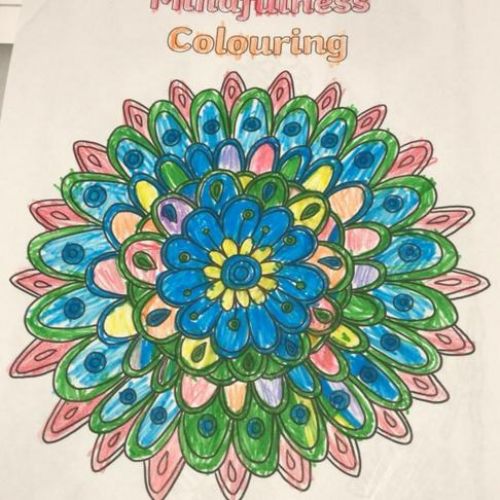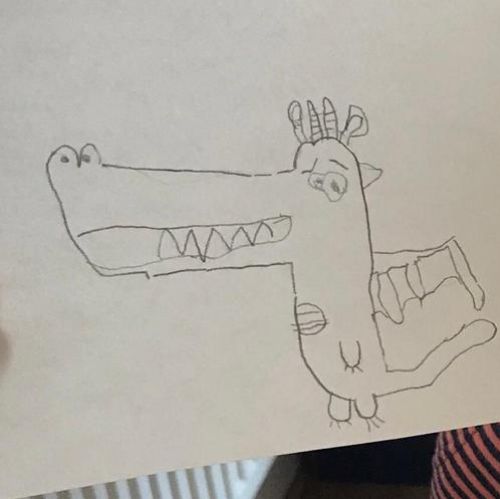Mental Health and Well Being
Mental Health Calendar - What's coming up!
10th October 2023 - Hello Yellow - Young Minds
Dress with a splash of yellow to help raise awareness of mental health in the young. We will teaming our school uniform with an item of yellow, discussing what good mental health looks like and thinking about what we can do to help ourselves achieve good mental health or notice and know what to do if our mental health is not as good as it should be.
10th October 2023- World Mental Health Day
World Mental Health Day is an opportunity for all of us to raise awareness of mental health issues and advocate against social stigma.
See above for our Hello yellow day to raise awareness
13th -17th November 2023- Anti-bullying Week
Anti-Bullying Week is organised by the Anti Bullying Alliance (ABA). The ABA is made up of anti-bullying organisations from all over the UK. They all work together offering a whole range of activities and resources to help schools focus and compliment their anti-bullying week programmes.
This is a powerful message that we talk to children about and each year we will discuss what bullying means, what should we do if we think if we are being bullied and things we can do to help ourselves.
5th-11th February 2023 - Children's Mental Health Week
Children's Mental Health Week 2024
5th-11th February
This years theme is "Let's Connect".
This is a perfect way to explore with children what loneliness is, how it feels and what wecan do if we feel lonely.
We will keep you posted nearer to the date of the fun things we will be doing at home and in school.
Have a look below at the fun things we got up to in past years Children's Mental Health Week.
Express yourself - some of the pictures that were sent by children who love to draw to help relax.
April 2022 - Stress Awareness Month
Stress Awareness Month
Stress Awareness Month has been held every year since 1992. It is a time where health care professionals will try and raise the awareness of the causes and cures of stress.
What will we be doing at Homefields?
At Homefields we are very aware that children can feel anxious and stressed about many things, both at school and at home. We will be taking the opportunity this week to help our children understand what stress is and what we can do to help not get stressed or help to relieve it.
The 5 ways to good Mental Health
- Connect with People
- Be Physically Active
- Learn New Skills
- Give to Others
- Pay Attention to the Moment - Mindfulness
October 2024 - Mental Health Awareness Week
Hosted by the Mental Health Foundation, Mental Health Awareness Week will take place next year in October
In school we will be looking at how anxiety is a normal emotion and how we all feel it. We will look at ways to manage our anxiety and how to deal with anxiety that won't go away.
Well-being displays
Each term we have assemblies themed on ways to good mental health. Look at our beautiful displays that we can use to help promote these themes.
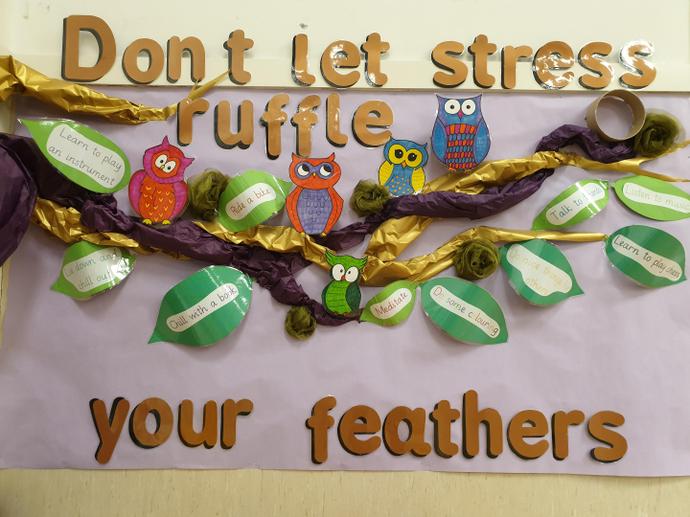
It is ok to have different emotions - this is what some of them look and feel like.
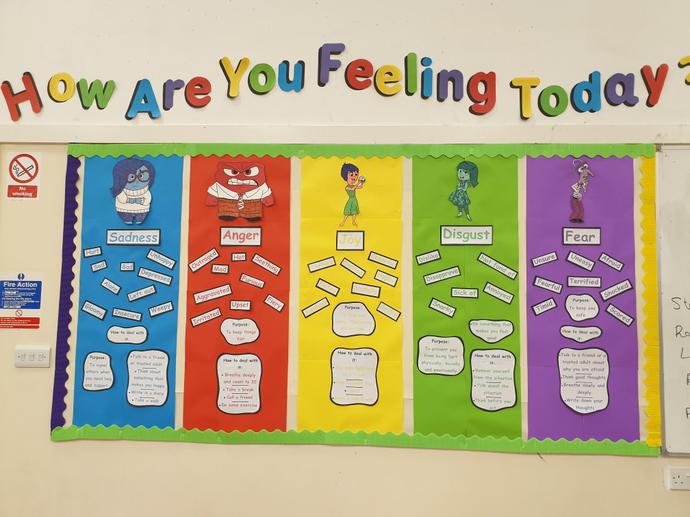
In class we talk to the children about being resilient and use "The Learning Pit" to help them visualise what learning looks like.
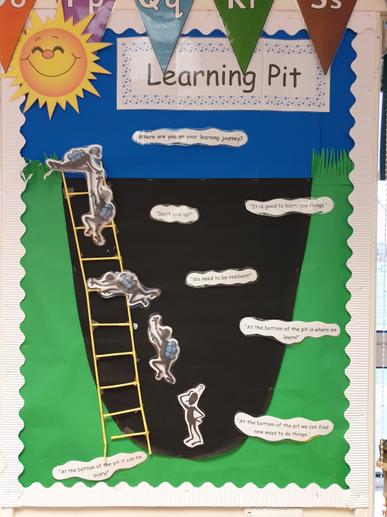
Hints and Tips for Parents
5 Ways to Good Mental Health
Connect With Others
Connecting with Others
Good relationships are vital for good mental health. They are needed for:
- providing emotional support
- an opportunity to share positive experiences
- to build a sense of belonging and self-worth.
There are lots of things you could do to help build stronger and closer relationships with family or friends:
- eat together - spending time round the dinner table, sharing what has happened over the day is so important.
- arrange time to be with friends
- TURN OFF GADGETS!
- Make time in your day to play, talk or read with your family, making sure the T.V. is switched off.
- DO NOT relay on technology or social media to build relationships.
(please see the NHS website for more details)
Be Physically Active
Physical Activity
Research has shown that taking part in physical activity causes chemical changes in your brain to positively change your mood. This helps to raise self-esteem and to set goals and then achieve them.
Government guidelines suggest that children should be doing up to 60minutes of physical activity each day. This could be a mix of activities such as walking, skating or climbing with vigorous activty at least three times a week.
Learn New Skills
Learning Something New
Research shows that learning something new can improve your mental health and wellbeing by:
- boosting self confidence and self esteem
- helping you to connect with others
- giving you a sense of purpose
This could be simple as learning to knit, skateboard, cycle. It could be starting a new club like climbing or rugby. It might be learning a new instrument or joining a choir.
It doesn't have to be expensive and it could be something that you are already good at but what to spend more time on like painting or running.
It doesn't mean putting yoursef under added stress of taking exams! This should be about you enjoying yourself.
(please see NHS website for more details)
Give To Others
Research suggests that giving to others can help boost your mental wellbeing by:
- helping you to connect with other people
- giving you a sense of purpose and self-worth
- creating positive feelings and a sense of reward
This doesn't have to be large acts but could be as simple as:
- Holding a door open for someone
- Picking up something that someone has dropped on the floor
- Taking a cake round to an elderly neighbour or grandparent
- Making a cup of tea for your mum or dad when you see they are tired at the end of the day.
The feel good factor of being kind and knowing you have bought a smile to the face of someone else is infectious and has such positive effects on your own mental health and wellbeing as well as brightening up another persons day!
(please see the NHS website for more details)
Pay Attention to The Present Moment (Mindfulness)
Mindfulness
Becoming more aware of the present moment can help us enjoy the world around us and understand ourselves better. It can positively change the way you feel about life and how you approach challenges.
Learning how to be calm in situations can help us deal with so many things that life throws at us, with better problem solving and decision making skills as children and then later as an adult. Research has also shown that mindfulness improves mental health and wellbeing, as well as reducing the negative effects of bullying.
Mindfulness helps us lean how to appreciate the world around us and can improve our state of mind heping to stay positive when faced with challenges.
There are many websites and books that talk about mindfulness. here is a link to activities that you could do at home.
https://mindfulness4u.org/mindfulness-activities-children/
(please see the NHS website for more details)
How Can I Help at Home?
Help at Home
Parenting is not easy! There is no instructional manual that comes with your baby and speaking to others can often give conflicting advice - other people always know what you should be doing to make your child eat, sleep and behave like a model child, which can often just make you feel worse about any problems you may be having at home!
The amount of times I have had parents ask me - "How do you do it? How do you control 30 children when I can't make my 1 child do as I ask?"
The answer is not simple, as no two children are the same. However, there are many things that we can do in a day to keep children motivated, on task, following instructions, working hard, and also to help them control their thoughts and emotions. Here are some things that might help at home.
- Love and respect - Children need to know that they are loved - so tell them. Even when they have done something wrong, you still love them and they need to know this. As teachers, we are always telling the children that it is ok to make mistakes. The way we change things for the better is by what we choose to do to about our mistakes. It can be hard to not lose your temper when your child has done something wrong, but often this can just aggravate a situation. If you are able to talk calmly through the situation together and ask your child to point out what they could/should have done differently, this will have the greater impact for the future.
- Clear boundaries - Children will push against you and test you. You have to mean what you say and do not deviate from this. There is no point saying to a child "Don't do that or you won't be going on holiday," if one week later you all go on holiday. This is an empty threat and children quickly realise this. If you say there you are going to put a ban on an item for a period of time, stick to it and don't back down!
- Choices - Sometimes we can give our children too much choice which they can't cope with. For example, when your little one won't get dressed as they have a whole wardrobe to choose from. Narrow this down and tell them they have the choice between two items, the red jumper or the blue. They still have choice but now you are in control and you get the end result of them wearing a jumper! Also limit the time they have to choose. Let them know that they have to the count of three or you will choose for them. Suddenly, you have a child who couldn't choose at all, making quick decisions from the choices that you wanted them to have in the first place!
- Sleep - This is critical for children's health and development! Teacher's can always tell the children who have regular calm bedtime routines. Limiting time on gadgets (especially not in the hour before bedtime) will help with sleep, as time on screens reduces the production of melatonin, which controls your sleep/wake cycle.
- Food - is good for your mood! Our minds are effected by what we eat and drink. Plenty of water and fresh fruit and vegetables can alter a child's mood/behaviour compared to a sugary diet.
- Rest and Relaxation! - This is so important in our busy lives that we need to teach this skill to our little people to equip them for adult life. This can be different for different people. it could be listening to music, drawing, reading, watching funny film, having a bath or going for a walk. Suggest different things to see which is best for your family. What is important is that you are together and in the moment. Not looking at a screen, answering phone calls or texts, but connecting with each other.
- Keeping active - exercise is so important, not just for our physical health but for our mental health as well. As we exercise, our bodies decrease the production of cortisol (a stress hormone) and release endorphines which help to regulate our moods and are our bodies way of making us feel good. Make time to play football, go cycling, play on the trampoline, or start yoga or running together.
- Talking - Last but often the most important! Sometimes we hold on to things that bottle up inside and can feel much worse than they actually are. Opening up about our feelings can be hard for us to do but once we start it can make our problems feel so much better. Encourage your child to talk, making them feel like you have time for them and are really listening. Often children will say that their parents don't have time to listen as they are always too busy. So, put that phone away and make time to chat, laugh and be together.
Mindfulness
What is Mindfulness?
Mindfulness is all about being in the moment, calmly acknowledging one's thoughts and feelings. A state of mind where there is an awareness of one's own presence and concious in the now.
For some people mindfulness was thought of as the new buzz word and that it would be forgotten in a few years time. At Homefields we recognise the importance of the calm state of mind against that of the mind of someone with fear, worry or anxiety.
Teaching our children mindfulness, equips the children of Homefields with skills they can take with them throughout their lives.
Mindfulness activities you can try at home
Kaleidoscope
Mindfulness Kaleidoscope video
Let go of all you worries and anxieties. Let your mind relax and unwind. Watch this video and let the colours and shapes empty your mind of everything around you.
Mindfulness Colouring
Mindfulness Colouring can be done on your own or with a friend. Put some relaxing music on in the background and zone into the colouring.

Tummy Breathing
Tummy Breathing is a brilliant activity to do daily to help train the mind to calm.
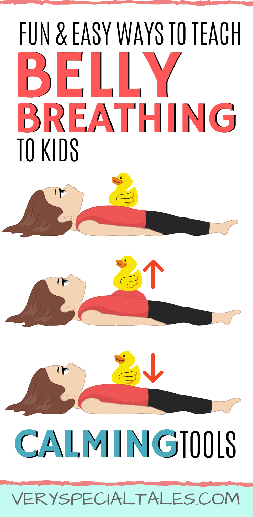
Mindfulness Bottles
Glitter Jars or Mindfulness Bottles
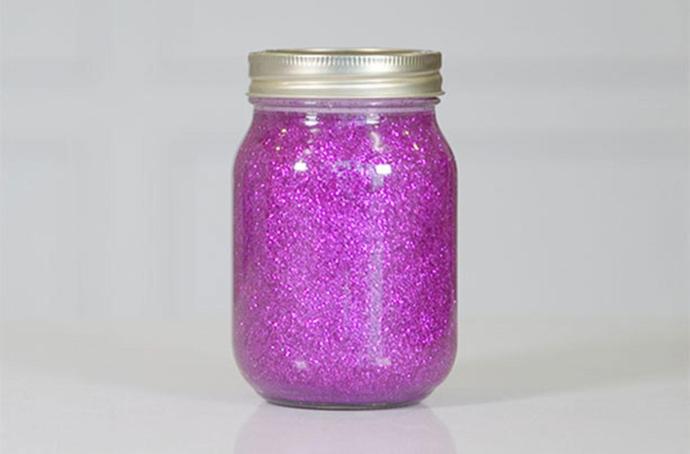
With their swirling patterns and pop of sparkle, these glitter jars or ‘calm down jars’ are the perfect antidote for stressed out kids – helping to soothe and calm troubled minds.
Just give them a good shake, then watch until the glitter settles in the bottom of the jar to refocus and refresh any overwhelmed child.
Glitter jars can also be used as a ‘time out’ timer. Simply tell your little one to watch the jar until the flakes have all fallen – it’s only at this point that they’ll be allowed to leave the time out area. Using extra glue will mean that the glitter floats for longer, so you can adjust the length of the time out according to the child’s age.
Mindfulness Journeys
Mindfulness Meditation for Kids THE MINDFUL PIRATE ~ 10 Mins Guided Meditation for Children
In this quick and fun mindfulness meditation for kids, The Mindful Pirate will teach you how to focus your mind with your magic spyglass and be the very best...
There are many more guided mediations on the internet. As you become more confident, maybe the adult could make up their own journey for the child. This could be to a magical kingdom, up into the clouds or to back to a family holiday that you enjoyed together.
Identifying Changes in Mental Health
There are lots of changes in behaviour as children grow up. So many of these are normal to childhood development, but some of these may point to mental health conditions such as depression and anxiety.
Always ask for support from your local GP or support services if you are worried. Here are some simple steps to help you spot some signs. M*A*S*K
- M = Mood - They get irritable, argumentative or aggressive towards you. They may blame you if things go wrong. They can also become withdrawn.
- A = Actions - They may experience changes in eating and sleeping patterns. Look out for any signs of bullying, alcohol, drugs or self-harm
- S = Social - They suddenly appear especially bored, lonely or withdrawn or they start to get into trouble. Losing interest in friends and other things they liked to do or missing school are common warning signs.
- K = They suddenly appear especially bored, lonely or withdrawn or they start to get into trouble. Losing interest in friends and other things they liked to do or missing school are common warning signs.
(Taken from Children's Mental Health - Action for Children Support
Gadgets, Screen Time and Mental Health
Managing Screen Time - Internet Matters
Digital Resilience Toolkit - Internet Matters
Wellbeing Apps - Internet Matters
Guide to Apps - Internet Matters
Gaming Advice Hub - Internet Matters
Useful resources
-
Children's Mental Health
NSCC website
-
Helping Children and Young People to Manage Anxiety
A practical guide to supporting pupils and students from the Anna Freud National Centre
-
Understanding brain science nad linking it to parenting
Flipping the lid. Understanding how a child's emotions can change so quickly
-
Children's guide to Coronavirus
This Powerpoint was made by the Children's Commissioner to help them understand about Covid-19
-
Coronavirus: A Book for Children
A book which explains coronavirus in a child friendly way. The book is illustrated by Axel Scheffler, illustrator of The Gruffalo and other well known stories
-
My Hero is You - How children can fight Covid -19
A picture book written to help children around the world understand about Covid-19
-
Difficult feelings about the Coronavirus pandemic
The charity Mind have some really useful information to help with feelings and emotions
-
A guide to emotions during Lockdown
A guide for adults and Young people to managing their emotions during Lockdown
The journey so far
Four years ago we started our journey of learning what is mental health and wellbeing and why it is so important for the staff and for the children at Homefields to understand how to have a positive and well mind. We also recognised that for many of us, at some time in our life we will need to recognise the signs of poor mental health and how to help ourselves and others.
It was important that we looked at mental health and well-being for both pupils and for staff. We began with the question of what is good mental health and how do you achieve this? At Homefields our learning attitudes help our children to have a positive outlook to their life long learning, equipping them with the skills of resilience, resourcefulness and respect which are so important to good mental health. Children are now taught explicitly about mental health and how the learning attitudes are positive tools that can effect their mental health.
Children are taught mindfulness in class, and have assemblies on how to achieve good mental health as well as learning about wellbeing and mental health through their PSHE, PE and Online safety.
We received the Bronze award for Mental Health from Leeds Carneigie University in 2020 and now have a mental health lead. We also have members of staff trained in Mental Health First Aid.
Staff use a tiered referral system in school for any children that they believe need support with their emotions. Classroom support is a crucial first step and staff work hard to ensure that children are supported with their emotions and wellbeing on a day to day basis. We also have access to a Play Therapist, an ELSA worker, a Drawing & Talking worker as well as access to the Trust counsellor.
At the parents request, we set up this page on our school website to give support and give advice to parents.
Mrs Rollerson and Mr Jones.
Verification Report from Carnegie Centre of Excellence for Mental Health
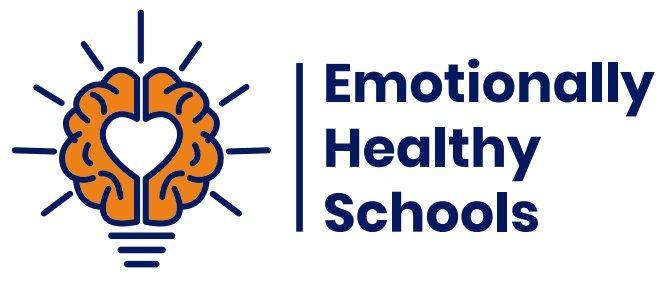
The Emotionally Healthy Schools project is Derby Opportunity Area funded project created specifically to improve the mental and emotional health provision in Derby Schools.
Check out the website for loads of useful tips, tools, resources, information and links to useful External Agencies across Derby, Derbyshire and beyond - www.emotionallyhealthyschools.org



